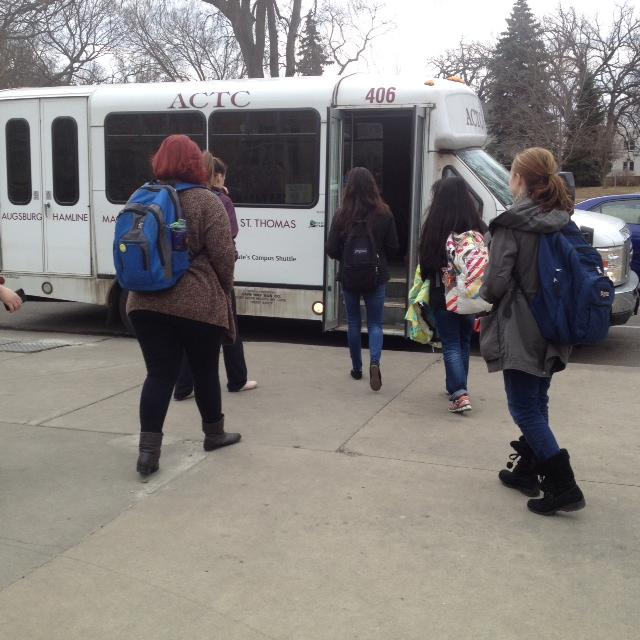Update: ACTC bus cancellation
Students board the ACTC bus, which will be discontinued after May 22.
April 23, 2015
Associated Colleges of the Twin Cities (ACTC) announced their bus service will close at the end of spring semester, but according to Hamline Dean of Students, Alan Sickbert, the five ACTC schools are committed to finding more efficient and convenient ways for cross-registered students to get to class.
The decision to eliminate the ACTC bus program was made partly in response to a survey by Student Affairs administrators at the ACTC schools that showed low ACTC bus ridership. According to the ACTC website, the ACTC staff and school administrators decided that other more affordable and sustainable transportation options can better serve the community than a private shuttle.
“The entire system cost around $200,000 dollars and it’s afforded to each of the five schools based on how many students are enrolled in each institution, so we pay 2,100 times the ACTC fee,” Sickbert said.
According to Carole Chabries, ACTC executive director, the fees schools pay do not cover the full cost of the bus, so ACTC is losing money.
The current bus schedule and routes make the commute to class longer than many public transportation routes. Chabries says that the current bus route is slow and ACTC is working to find transportation alternatives that will reduce travel time.
According to Metro Transit the Bus Rapid Transit (BRT) A Line route will open this year. BRT routes make fewer stops and require passengers to pay the bus fare in advance to decrease boarding times. Hamline ACTC students will be able to take the A Line bus to the light rail for classes in Minneapolis, to the Grand Avenue and Snelling intersection for classes at Macalester and to transfer points for classes at St. Thomas and St. Kate’s.
Currently, Hamline students can purchase a Metro Transit pass for $175 per semester. According the Sickbert, Hamline is working to make the system more affordable for cross-registered students.
“Right now our goal is to focus on cross-registered students said Sickbert. We’re going to give them information this spring and look at how much we can subsidize them,” said Sickbert.
Each of the ACTC schools has access to public transportation routes. Students can use the online Metro Trip Planner to plan routes between the campuses.
Metro and the ACTC schools are working to together to find solutions, Chabries says Metro Transit is very supportive in finding ways to help.
Cancelling the ACTC to will affect riders, but new transportation options may make the commute between campuses more efficient. In addition to public transportation, the Twin Cities offers car share programs such as HourCar and Car2Go. They also have a Nice Ride bike share program.
Each individual school is responsible for working with the staff and students to find their own solutions for new transportation opportunities. Cross-registration gives students access to many more classes and communities. The ACTC website states that the cross-registration between ACTC schools was officially incorporated in July of 1975 and that they still support cross-registration and are committed to helping students.
“The bus is supporting cross-registration, so it’s really important for us to find a way for students to get around,” said Chabries.






